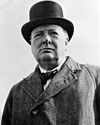James Grigg
Sir James Grigg | |
|---|---|
 | |
| Secretary of State for War | |
| In office 22 February 1942 – 26 July 1945 | |
| Monarch | George VI |
| Prime Minister | Winston Churchill |
| Preceded by | David Margesson |
| Succeeded by | Jack Lawson |
| Personal details | |
| Born | 16 December 1890 Exmouth, Devon |
| Died | 5 May 1964 |
| Nationality | British |
| Alma mater | St John's College, Cambridge |
Sir Percy James Grigg, KCB, KCSI, PC (16 December 1890 – 5 May 1964), better known as Sir James Grigg, was a British civil servant who was unexpectedly moved - at the behest of his patron Winston Churchill - from being the Permanent Under-Secretary of State at the War Office to become Secretary of State for War, the political head of the same department during the Second World War.
Background and education
The son of Frank Alfred Grigg, a carpenter, Grigg was born in Exmouth and won a scholarship to Bournemouth School and St John's College, Cambridge[1] where he studied mathematics, achieving first-class honours in both parts of his tripos.
Career in civil service
In 1913 he came first in the civil service examination and he served in the Treasury. During the First World War he served in the Royal Garrison Artillery. After the war he returned to the Treasury and in 1921 he became Principal Private Secretary to the Chancellor of the Exchequer, serving several successive Chancellors including Winston Churchill. He held this post until 1930 when he became Chairman of the Board of Customs and Excise and Chairman of the Board of Inland Revenue. In 1934 he was transferred to New Delhi, India, where he became Finance Member of the Government of India in anticipation of limited self-rule that began in 1935. He remained in New Delhi until 1939. Grigg continued to influence British imperial policies on India especially after his patron Winston Churchill became Prime Minister. In 1939 Grigg became Permanent Under-Secretary of State for War and oversaw a turbulent department, which in 1940 witnessed no less than four different Secretaries of State (Leslie Hore-Belisha, Oliver Stanley, Anthony Eden and David Margesson).
Secretary of State for War
He proved an effective civil service head but it came as a great shock to many when in February 1942 Churchill dismissed Margesson and replaced him with Grigg – who had to convey the news to Margesson himself. Amongst the many Ministerial appointments made by Churchill from outside the sphere of Westminster politics, this was seen as one of the most unusual, but was a response to considerable military setbacks such as the loss of Singapore, and the need to appease critics by replacing some ministers. Grigg retained his post for the rest of the war, holding it also in Churchill's 1945 "Caretaker Government". In 1942 he was elected as Member of Parliament (MP) for Cardiff East, beating Fenner Brockway. However, in the 1945 general election he lost his seat and left public life.
Later life
In his later years Grigg held many directorships, including those of the Imperial Tobacco Company, the Prudential Assurance Company, the National Provincial Bank and the Distillers Company. In 1946, he became the first British executive director of the International Bank for Reconstruction and Development. He died on 5 May 1964, aged 73.
Family
He married Gertrude Charlotte Hough, daughter of the Reverend George Frederick Hough, in July 1919. The marriage was childless.
References
- ^ Sir Raymond Streat (1987). Lancashire and Whitehall: The Diary of Sir Raymond Streat. Manchester University Press. p. 307. ISBN 978-0-7190-2390-3. Retrieved 6 November 2015.
External links
- 1890 births
- 1964 deaths
- Alumni of St John's College, Cambridge
- Permanent Under-Secretaries of State for War
- Civil servants in HM Treasury
- Private secretaries in the British Civil Service
- Chairmen of the Board of Inland Revenue
- Chairmen of the Board of HM Customs and Excise
- Conservative Party (UK) MPs
- Members of the Parliament of the United Kingdom for Welsh constituencies
- Royal Artillery officers
- Secretaries of State for War (UK)
- UK MPs 1935–45
- UK MPs 1945–50
- Members of the Privy Council of the United Kingdom
- People from Exmouth
- People educated at Bournemouth School
- Knights Commander of the Order of the Bath
- Knights Commander of the Order of the Star of India
- War Office personnel in World War II

